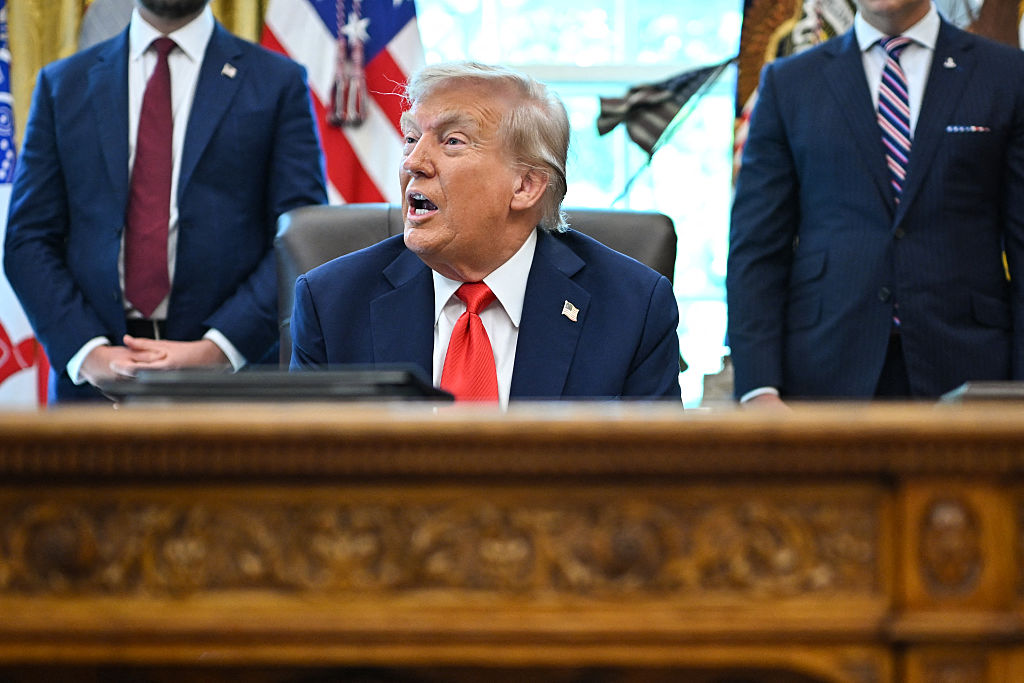President Donald Trump signed an executive order on Monday directing the Justice Department to pursue criminal penalties against people who “desecrate” the American flag—including by burning it—setting up a direct collision with a landmark Supreme Court ruling that shielded such acts as protected speech.
[time-brightcove not-tgx=”true”]
“All over the world they burn the American flag,” Trump said in the Oval Office as he signed the order. “The people in this country don’t want to see our American flag burned and spit on and by people that are, in many cases, paid agitators.”
While Trump suggested he wanted to charge flag burners in a way that didn’t run afoul of Supreme Court rulings, he also made clear he did not believe flag burning should be viewed as protected speech. “If you burn a flag, you get one year in jail,” Trump noted. “No early exits, no nothing… And it goes on your record.”
The executive order instructs Attorney General Pam Bondi to prosecute those who burn or desecrate the American flag in ways that cause “harm unrelated to expression, consistent with the First Amendment,” the directive says. “This may include, but is not limited to, violent crimes; hate crimes, illegal discrimination against American citizens, or other violations of Americans’ civil rights; and crimes against property and the peace, as well as conspiracies and attempts to violate, and aiding and abetting others to violate, such laws.”
The order also tells the DOJ to refer flag-desecration cases to state and local authorities, even as many of those jurisdictions once relied on statutes the Supreme Court struck down more than three decades ago.
The move revives a long-running political fight over patriotism and protest that the Court sought to settle in 1989. In Texas v. Johnson, a 5–4 decision written by Justice William Brennan Jr., the justices held that the First Amendment protects expressive conduct such as burning the American flag. Justice Anthony Kennedy, in a separate concurrence, acknowledged the ruling’s unpopularity but wrote that “the flag protects those who hold it in contempt,” underscoring that constitutional guarantees do not hinge on whether speech is agreeable.
Read More: Why It’s Legal To Burn The American Flag
Trump’s order appears designed both to test and to narrow that precedent. “They called it freedom of speech,” Trump said, referring to the decision in Texas v. Johnson. “But there’s another reason, which is perhaps much more important—it’s called death. Because what happens when you burn a flag is the area goes crazy… it incites riots at levels that we’ve never seen before.”
Legal experts were skeptical the order would withstand constitutional scrutiny. “Flag burning as a form of political protest is protected by the First Amendment,” says Robert Corn-Revere, chief counsel of FIRE, a national free speech group. “While people can be prosecuted for burning anything in a place they aren’t allowed to set fires, the government can’t prosecute protected expressive activity — even if many Americans, including the president, find it ‘uniquely offensive and provocative.’”
Beyond urging federal prosecutors to bring charges, it directs the administration to take sweeping immigration-related steps against noncitizens who engage in flag desecration—to “deny, prohibit, terminate, or revoke visas, residence permits, naturalization proceedings, and other immigration benefits, or seek removal,” according to the order.
“American Flag burning is also used by groups of foreign nationals as a calculated act to intimidate and threaten violence against Americans because of their nationality and place of birth,” the order said.
The order describes the flag as “the most sacred and cherished symbol of the United States,” calling acts of desecration “uniquely offensive and provocative” and “statement of contempt, hostility, and violence against our Nation.”
The directive’s immigration provisions broaden the initiative beyond criminal enforcement to civil and administrative penalties that may be more insulated from immediate constitutional challenge, even as they raise their own free-speech questions.
Monday’s order arrives after a period in which images of flag burnings have periodically circulated online and on cable news—including at protests in Washington, D.C. during Prime Minister Benjamin Netanyahu’s address to Congress, and in New York’s Washington Square Park on July 4.
Trump has for years called for tougher penalties for flag burning. In a 2024 Fox and Friends interview, he said people who desecrate the flag should face a one-year jail sentence and has at times floated a constitutional amendment to criminalize the practice.

